My True Love: A Perfect Musical Fairytale
A musical fairy tale of the choices made when the world is a place of dreams.
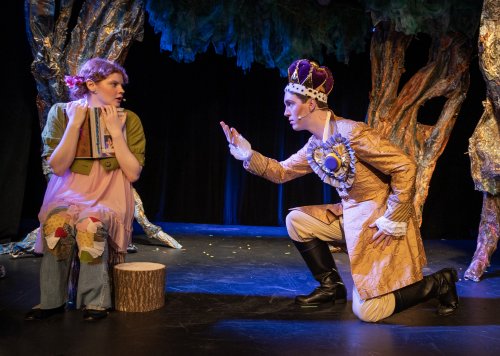
Mairead Connor and Andrew McNamara in a scene from Ben Boecker’s “My True Love: A Perfect Musical Fairytale” at The Players Theatre (Photo credit: Asher Dorlester)
My True Love: A Perfect Musical Fairytale is a musical fairy tale, written by Ben Boecker, about the choices made when the world is a place of dreams. Solid direction by Carolyn Popadin guides the diverse cast as it takes the audience on a romp through a magic land of self-discovery as a young witch explores the complex ideas surrounding consent, self-realization, and acceptance.
Don’t let the heavy-sounding themes throw you off; the show is a frothy musical comedy with a good ensemble and a couple of outstanding individual performances. It intentionally comes close to a feeling of a student production, but that idea strongly supports the overall thrust of the show.
The play opens with a production number which is a prologue. The entire ensemble sings “This Is A Perfect Musical Fairytale,” which provides the background to the characters and establishes the parameters of the story. It tells of a time 20 years before and ends with the present. We learn that three of the four sisters fell in love with magical frogs, and when they kissed the frogs, their magical powers became embedded in their hearts, replacing human love.
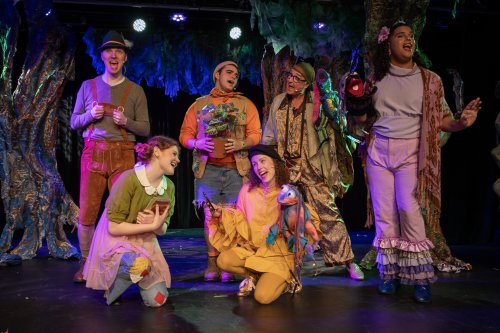
The cast of Ben Boecker’s “My True Love: A Perfect Musical Fairy Tale” at The Players Theatre (Photo credit: Asher Dorlester)
One sister, Julianna (Livi Rose), refused to kiss her frog because she was in love with Henrik (Andrew McNamara). Her three sisters, Henrietta (Ruben Fernandez), Carmaletta (Kate Keating) and Pat (Joe Kassner), become angry with her refusal and make Henrik disappear and take Julianna’s love from her heart without consent. The result, Julianna turns into Fran, a middle-aged woman with a thick Brooklyn/Queens accent. The script calls for a Long Island accent, but what comes out is very much Brooklyn/Queens. The sisters then banish her from their part of the Magic Land forest. Julianna/Fran and Henrik had a daughter named Cedarella, whom the three sisters took to raise as their own with the intention of turning her into a witch like themselves.
Cedarella, a young witch-in-waiting, perfectly embodied by Mairead Connor in a strong performance, believes the stories from the fairytale book she received from her parents before they disappeared. So she embarks on a search for her Perfect Prince after her aunts try to get her to kiss a frog.
Her journey challenges the fairytale view of love she learned from her aunts, who believe magic is released when one falls in love with and kisses a frog. Cedarella wants to find honest and true love by finding the Perfect Prince. Her aunts aim to prevent that and use their magic to create a robot prince they call the Love-Machine, beautifully played by McNamara, who also appears as Henrik. The Love Machine can project magic to make anyone fall in love with it, and it also has a button that turns it into a marauding machine that takes away the love of anyone who gets near.
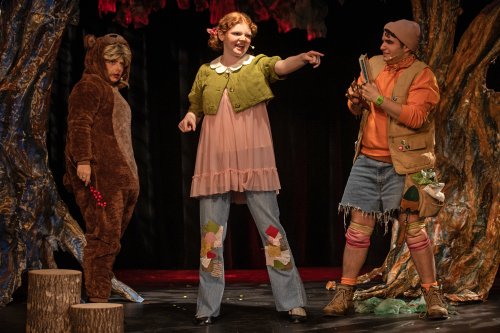
Livi Rose, Mairead Connor and Julian Schenker in a scene from Ben Boecker’s “My True Love: A Perfect Musical Fairytale” at The Players Theatre (Photo credit: Asher Dorlester)
Cedarella tells the audience exactly what she will seek in her Perfect Prince. Connor gives an excellent performance of a song with lyrics that reveal much about Cedarella’s view of the man of her dreams. It is a clever song packed with precise details of what she expects in her Prince.
But he better have smold’ring eyes and sparklin’ molars
And awesome thighs and packed abdominals
Sturdy-arched feet, nice lower-ear cartilage, juggling
Skills, okay that’s optional
And later:
Oh, my true love doesn’t have to be a lot of things
But he better be strong and hot and real good lookin’
And tan and tough and good at cookin’
And twenty twenty and sweet as honey
And quite well-mannered and also funny
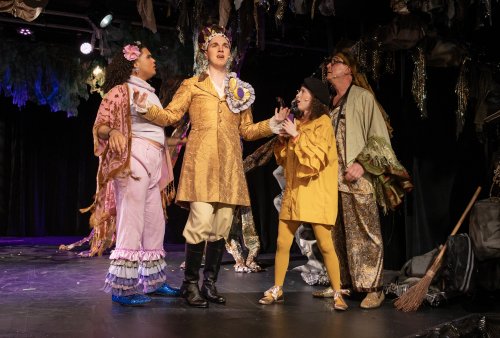
Ruben Fernandez, Andrew McNamara, Kate Keating and Joe Kassner in a scene from Ben Boecker’s “My True Love: A Perfect Musical Fairytale” at The Players Theatre (Photo credit: Asher Dorlester)
When she finishes the song, her Aunt Henrietta says that the frog, Funkadella, is ready for her kiss, and with that, Cedarella runs out the door to find her Perfect Prince. In the woods, she tries something she read in the fairytale book and calls out for her Prince to appear. At that moment, Hunter (Julien Schenker) appears, disoriented because of some berries he ate that transported him to the woods of Magic Land.
He is immediately smitten with Cedarella and tells her in a song that he is an extreme gardener in Magic Land to plant some special plants. After he sings his song, he approaches Cedarella to kiss her without consent, and she stops him. The theme of consent appears throughout the show, relating to different aspects of personal interactions. It is a witch’s rule that love cannot be taken from a person without their consent, and in the case of the witch sisters, it has to do with what they did to their sister Julianna and her husband Henrik.
The ensemble is solid in portraying its wild array of characters, including the frog puppets, with performances that, at times, get close to overacting without it happening. Their actions have a commedia dell’arte sensibility in the sense of their silliness and anarchic qualities. There is an improvisational feel to some of the characterizations, most especially in the actions of the witch sisters.
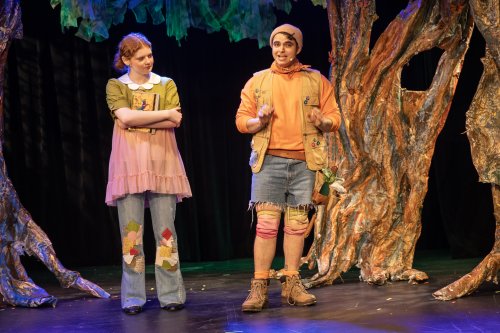
Mairead Connor and Julian Schenker in a scene from Ben Boecker’s “My True Love: A Perfect Musical Fairytale” at The Players Theatre (Photo credit: Asher Dorlester)
The show is not without faults, such as some logical issues concerning Cedarella’s birth and her parent’s relationship with that birth or why the sisters didn’t realize their magic was damaged for over 20 years. While the songs are clever, some lyrics need to be revised because the rhymes are forced or don’t fit the music. There are also moments when the dialogue needs to be tightened to improve the flow of the story.
Rose and Conner’s performances are outstanding in terms of solid vocals and fully realizing their characters. Conner provides her character with a wide-eyed, yet shrewd, innocence and convincingly delivers her songs. Rose is outstanding in presenting three characters: Julianna, Fran, and Bernadette Peters. Her vocals are first-rate and her Brooklyn/Queens accent is “to die foh.”
A hallmark of Off-Broadway theaters is the size of the performance space; the more scene changes in a play, the more difficult it is to provide the necessary production values. Michael Arriaga’s sets are admirable in providing good scenic separation in a constrained space. Shino Frances’ lighting design gives solid support to the performances and the sets. Sound design is crucial in a musical, and Chris Neuner delivers it well. Chloe Levy’s costume collection of eccentric, witty costumes perfectly fit the story’s fairytale quality. Although dance was only a minor part of the production, Lauren Bobrow’s choreography made a solid contribution to the show.
My True Love: A Perfect Musical Fairy Tale (through June 2, 2024)
The Players Theatre, 115 MacDougal Street, in Manhattan
For tickets, visit https://mytruelovemusical.com/
Running time: 100 minutes including an intermission






Every bit of this show is magical and unique! We found it energizing and witty, with a talented cast and crew. Love who you want to love!